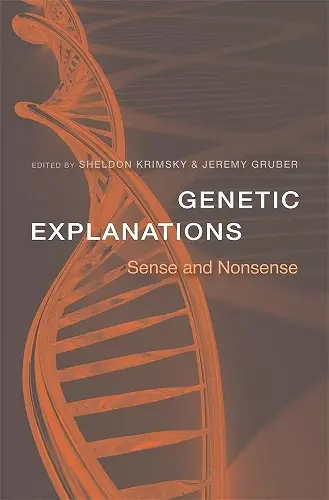Genetic Explanations
Sense and Nonsense
Sheldon Krimsky editor Jeremy Gruber editor
Format:Hardback
Publisher:Harvard University Press
Published:28th Mar '13
Currently unavailable, and unfortunately no date known when it will be back

A welcome contribution, Genetic Explanations will be a valuable resource for those seeking to sort exaggerated claims about genetic causation from solid scientific achievements. -- Troy Duster, author of Backdoor to Eugenics Important and optimistic, Genetic Explanations clears the way for an open discourse on human identity in the age of DNA, clearly demonstrating the many ways in which the information in our DNA interacts with our experience over the course of a lifetime. -- Robert Pollack, Professor of Biological Sciences and Director of the Center for the Study of Science and Religion, Columbia University
No longer viewed by scientists as the cell’s fixed master molecule, DNA is a dynamic script that is ad-libbed at each stage of development. What our parents hand down to us is just the beginning. Genetic Explanations urges us to replace our faith in genetic determinism with scientific knowledge about genetic plasticity and epigenetic inheritance.
Can genes determine which fifty-year-old will succumb to Alzheimer’s, which citizen will turn out on voting day, and which child will be marked for a life of crime? Yes, according to the Internet, a few scientific studies, and some in the biotechnology industry who should know better. Sheldon Krimsky and Jeremy Gruber gather a team of genetic experts to argue that treating genes as the holy grail of our physical being is a patently unscientific endeavor. Genetic Explanations urges us to replace our faith in genetic determinism with scientific knowledge about how DNA actually contributes to human development.
The concept of the gene has been steadily revised since Watson and Crick discovered the structure of the DNA molecule in 1953. No longer viewed by scientists as the cell’s fixed set of master molecules, genes and DNA are seen as a dynamic script that is ad-libbed at each stage of development. Rather than an autonomous predictor of disease, the DNA we inherit interacts continuously with the environment and functions differently as we age. What our parents hand down to us is just the beginning. Emphasizing relatively new understandings of genetic plasticity and epigenetic inheritance, the authors put into a broad developmental context the role genes are known to play in disease, behavior, evolution, and cognition.
Rather than dismissing genetic reductionism out of hand, Krimsky and Gruber ask why it persists despite opposing scientific evidence, how it influences attitudes about human behavior, and how it figures in the politics of research funding.
A welcome contribution, Genetic Explanations will be a valuable resource for those seeking to sort exaggerated claims about genetic causation from solid scientific achievements. -- Troy Duster, author of Backdoor to Eugenics
Important and optimistic, Genetic Explanations clears the way for an open discourse on human identity in the age of DNA, clearly demonstrating the many ways in which the information in our DNA interacts with our experience over the course of a lifetime. -- Robert Pollack, Professor of Biological Sciences and Director of the Center for the Study of Science and Religion, Columbia University
ISBN: 9780674064461
Dimensions: unknown
Weight: unknown
384 pages